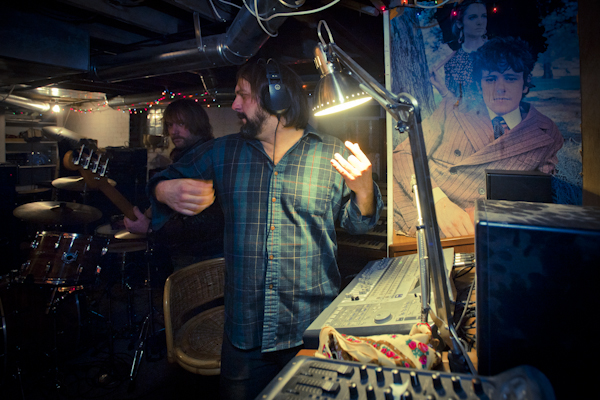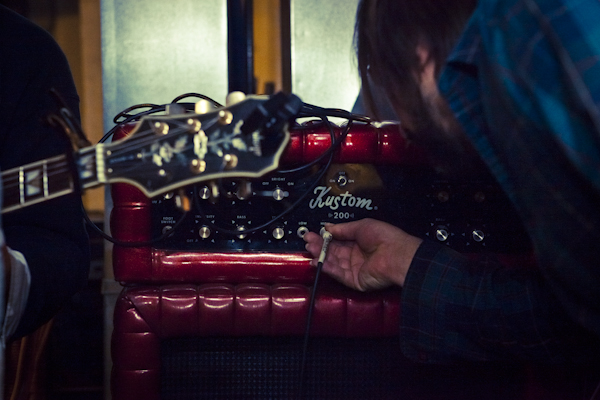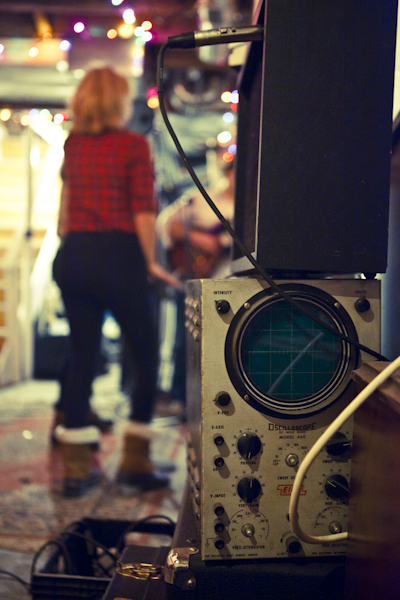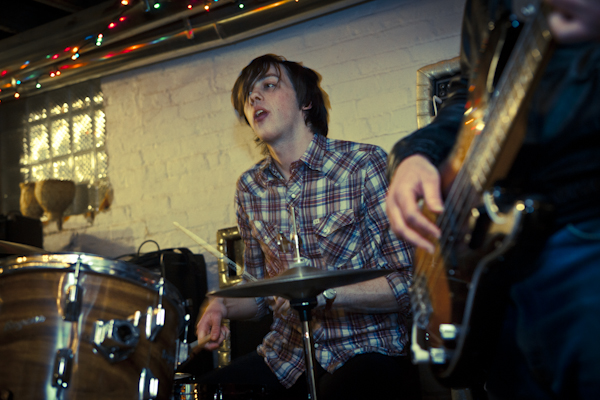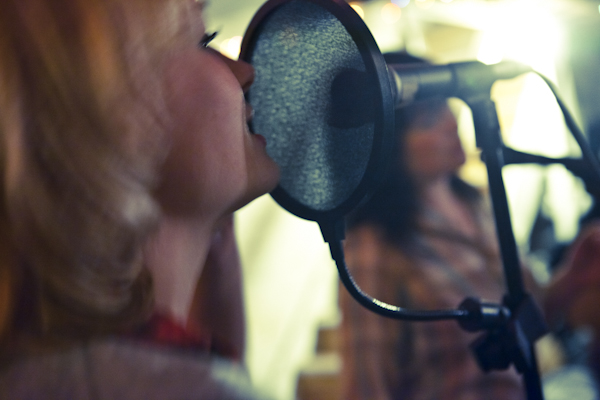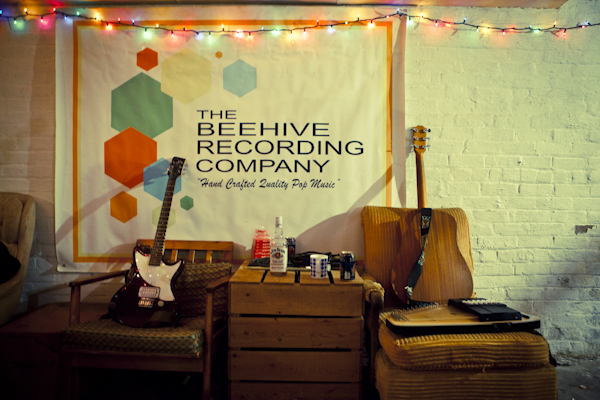Getting away with it: Beehive Recordings takes DIY music buzz to next level
Say hello again to do-it-yourself media specialist Chris Handyside, who returns to Model D with a new series on the Detroit independent arts and culture scene. Welcome back, rocker.
If you buy the notion that freedom’s just another word for nothing left to lose, then you gotta admit its converse: Freedom’s another word for everything left to gain. In the landscape of Detroit’s fertile rock scene, there’s perhaps no recent label that makes that case more strongly than Beehive Recordings.
Beehive — initially launched in 2008, but more successfully re-launched in “2.0” form this past Independence Day — is the kind of label that could only happen in Detroit — a unique mix of the aforementioned tabula rasa-driven freedom, DIY enthusiasm, inspired make-it-and-take-it invention, hard-won business savvy and idiosyncratic artistic vision. And unifying it all? An undying respect for the power that rock ‘n’ roll music in all its manifold forms and charms plays in shaping, coloring and reflecting our lives.
The man stirring the hive is Detroit musician Steve Nawara – a longtime contributor to Detroit’s thriving rock scene whose credits include a six-year stint as the original bass player in the Wildbunch/Electric Six as well as in area-scene supergroup Conspiracy of Owls and the late outfit Magic Shop. Those bona fides alone would qualify him to run a damn solid local record label. But Nawara’s X factor is a combination of his personality traits: Amiable, thoughtful and boundlessly enthusiastic. In other words, he’s one of Detroit’s culture creators who also happens to be a solid dude that people inherently trust. It’s those qualities he brings to bear tending his fledgling-but-expanding business venture.
Beehive embodies the spirit of what’s good about the Detroit music scene: Transparent, collaborative, nimble and grassroots. Over just the past six months, Beehive has released recordings of a who’s-hot and who’s-next of Detroit music.
Recent releases include showstopping punk from Joe Dirty, introspective folk-rock from the Findlay Sisters, psych-rock by the Go’s bobby Harlow and songwriter Aran Ruth as well as some of the best pure rock n’ roll from bands like the late-lamented Bogue and local fixtures the Hentchmen. As well as more oddball offerings like 8-bit video game soundtrack recordings of the Wildbunch’s classics “Gay Bar” and “Don’t Be Afraid of the Devil.” Check out all the artists here.
A vertically-integrated enterprise
Beehive’s reach and ambition goes beyond the couple-45s-a-year-and-a-cloud-of-dust norm model for a few reasons: Firstly, it’s digital-only and totally free. Beehive is supported by pay-what-you-want, if-you-want donations from folks who download songs. Secondly, Nawara has set it up as a vertically-integrated enterprise, often scouting, recording, performing with, producing, encoding, distributing and promoting jams from soup-to-nuts. Register and start downloading now.
For Nawara, Beehive is driven by three powerful ideals: create a sustainable way to put out records that treats musicians with the respect they deserve; give a reliable, plugged-in outlet to the deeply-rich pool of talent in the Detroit music scene; release jams that remind people of music’s power to move — and make it available for free, sans guilt.
Beehive started as a buzz in Nawara’s head following his experiences with the major label world. His tenure in the Electric Six found him party to two bouts of exposure to the corporate machinery. During the tail end of the 1990s alt-boom, the Wildbunch was courted by then-major Hollywood Records — an experience that left the first sour, corporate-tinged taste in Nawara’s mouth. Then, a couple years later, the Electric Six scored an unlikely hit with its songs “Danger! High Voltage!” “Gay Bar” and “Dance Commander” (particularly in the UK, where they were signed to major-indie label, XL Records).
“After playing in the Electric Six and seeing the music industry first hand — going from party to party, fancy dinners and champagne and all that stuff — and I’ll always be grateful for that experience, don’t get me wrong! — I realized that the only free dinner you get is the one before you sign the contract,” says Nawara.
Beehive is, in a way, at the sweet spot where new media, a local focus and small business intersect to form something larger than the sum of their parts. Nawara sees this as key and points to New Orleans as inspiration.
“I was down in New Orleans before I re-opened,” he recalls. “And small business has such a hold on that city. It’s amazing. They understand that their music is their power. And now I just keep seeing all these parallels. From French architecture and design to that small business attitude. I feel like that’s what Detroit needs. The power of small business and the power of music,” he says, can be a powerful catalyst.
“We don’t have the birth of jazz, but what we do have is this incredible diversity of music. And that’s the strong point is the diversity. The garage rock stuff is great, and that’s what I’m closest to, but there’s way more out there, too.”
He’s constantly wearing the curatorial hat that keeps his label’s releases interesting and his label full of fresh discoveries. Sometimes, those artists find him even at the most inconvenient times, too.
“In the case of Laura Findlay, I was at a Hentch party (a party at the home of the Hentchmen’s John Szymanski) and she came up and knew who I was and told me she had these songs that she had written. She was like ‘I’m just gonna sing it to you right now,'” he laughs.
Another reason Beehive can stay so nimble and flexible is that Nawara has added a wrinkle to his earlier vertical integration strategy. In addition to being a kick-ass bass and guitar player his own self, he doesn’t have to travel more than a flight of stairs to tap his rock-solid “house band.”
“I have great roommates. Jake Culkowski is the house bass player without a doubt. Ben Luckett is my other roommate and he’s a fantastic drummer. So he’s the house drummer. They get really involved.”
And more recently, he’s been tapping bandmate Harlow as in-house producer.
Set the Music Free
The first incarnation of Beehive launched in 2008, just as the music industry was started to realize that critical mass had tipped consumption away from hard copy and into the digital world. Nawara’s idea was to put out recordings by Detroit-based musicians online and charge a reasonable amount for each download. All the pieces seemed to be in place from the home studio to the bandwidth. Except, he admits, the idea wasn’t quite fully-fleshed out yet. He released recordings by a diverse range of bands — from hard-bitten blues-rockers Cuckold to the playfully kitsch rap of EsQuire.
Thing is, Beehive 1.0 didn’t work. “I got too cutesy with it at first. There was a bee that you cold drag into the site sections and all that stuff. And that was neat, but it wasn’t very practical and didn’t do anything to help the music.”
So last spring, Nawara and friends hit the woodshed, rebuilding Beehive into something both simpler and more accessible. Nawara tapped local musician and computer programmer Vince Mazzola to come up with a simple, clean interface that took down the barriers to the music and made the site simple to navigate. And on Independence Day, Beehive was re-launched.
If you like the music and want to make a donation to support the label, you can. They started releasing music at a much quicker pace, free from any obligation to have the last release paid for before the next one could see the light of day. And what started as a steady trickle has turned into a weekly rush of great music.
“Unless I’m buying vinyl,” says Nawara, “I don’t pay for music. Period. I encourage people not to. And this is coming from a broke musician, right? You think you’re supporting your bands by paying for music online. You’re not.”
Donations large and small have come in from Scotland, Sweden, New York City, Chicago and, of course, the Detroit area. There’s a ticker that lists recent donations on the site — like a pledge drive.
Nawara says Beehive has about 500 members right now and pegs downloads at about 2,000 and counting. Actually, he points with pride to the fact that his weekly and compiled “Top 10” lists show real numbers of downloads, updated daily.
“Sometimes it’s like my version of watching the stocks. I get really excited to check in on ’em,” he says.
Rockin’ in the physical world
As for the future, Nawara’s tight-lipped about specifics. But his plans do include hosting a regular Beehive Ball — a formal event in a non-traditional music space where folks who dig the sounds they’re finding online can meet and dance with each other. Yes, in the physical world. And he hints that he might be planning a float in this year’s Detroit St. Patrick’s Day Parade.
And his plans certainly include reaching out to as many music fans as possible and getting great tunes in their hands. With increased membership in the Beehive swarm comes the ability to promote with a wider, broader reach in online and print publications like Vice, and other music-focused outlets. And that brings the whole thing full-circle: Even more music in more heads and hands.
“This year’s gonna be a load of fun. Not just for me but for but hopefully for the bands and members,” he says. “I don’t want people to feel guilty about listening to the music. Listen to the music. Download it. Share it. Sometimes people have some apprehension for accepting things for free people thinking they’re getting away with something,” he says with a laugh. Nawara is always laughing.
“Guess what? You are getting away with it.”
Chris Handyside is a former Model D editor and once toiled as music editor for downtown-based weekly the Metro Times. He fell in love with a band called the White Stripes and dared to write a book about it.
